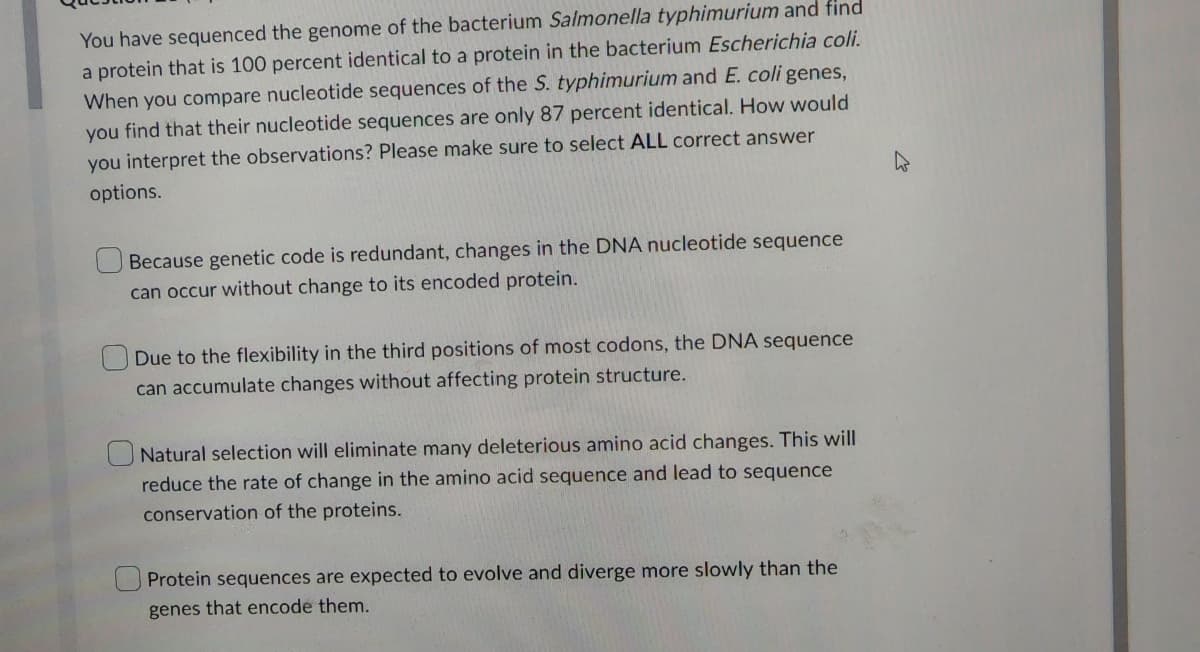You have sequenced the genome of the bacterium Salmonella typhimurium and a protein that is 100 percent identical to a protein in the bacterium Escherichia coli. When you compare nucleotide sequences of the S. typhimurium and E. coli genes, you find that their nucleotide sequences are only 87 percent identical. How would you interpret the observations? Please make sure to select ALL correct answer options. Because genetic code is redundant, changes in the DNA nucleotide sequence can occur without change to its encoded protein. Due to the flexibility in the third positions of most codons, the DNA sequence can accumulate changes without affecting protein structure. Natural selection will eliminate many deleterious amino acid changes. This will reduce the rate of change in the amino acid sequence and lead to sequence conservation of the proteins. Protein sequences are expected to evolve and diverge more slowly than the genes that encode them.
You have sequenced the genome of the bacterium Salmonella typhimurium and a protein that is 100 percent identical to a protein in the bacterium Escherichia coli. When you compare nucleotide sequences of the S. typhimurium and E. coli genes, you find that their nucleotide sequences are only 87 percent identical. How would you interpret the observations? Please make sure to select ALL correct answer options. Because genetic code is redundant, changes in the DNA nucleotide sequence can occur without change to its encoded protein. Due to the flexibility in the third positions of most codons, the DNA sequence can accumulate changes without affecting protein structure. Natural selection will eliminate many deleterious amino acid changes. This will reduce the rate of change in the amino acid sequence and lead to sequence conservation of the proteins. Protein sequences are expected to evolve and diverge more slowly than the genes that encode them.
Biology: The Dynamic Science (MindTap Course List)
4th Edition
ISBN:9781305389892
Author:Peter J. Russell, Paul E. Hertz, Beverly McMillan
Publisher:Peter J. Russell, Paul E. Hertz, Beverly McMillan
Chapter19: Genomes And Proteomes
Section: Chapter Questions
Problem 1ITD: Below is a sequence of 540 bases from a genome. What information would you use to find the...
Related questions
Question

Transcribed Image Text:You have sequenced the genome of the bacterium Salmonella typhimurium and find
a protein that is 100 percent identical to a protein in the bacterium Escherichia coli.
When you compare nucleotide sequences of the S. typhimurium and E. coli genes,
you find that their nucleotide sequences are only 87 percent identical. How would
you interpret the observations? Please make sure to select ALL correct answer
options.
Because genetic code is redundant, changes in the DNA nucleotide sequence
can occur without change to its encoded protein.
Due to the flexibility in the third positions of most codons, the DNA sequence
can accumulate changes without affecting protein structure.
Natural selection will eliminate many deleterious amino acid changes. This will
reduce the rate of change in the amino acid sequence and lead to sequence
conservation of the proteins.
Protein sequences are expected to evolve and diverge more slowly than the
genes that encode them.
Expert Solution
This question has been solved!
Explore an expertly crafted, step-by-step solution for a thorough understanding of key concepts.
Step by step
Solved in 2 steps

Knowledge Booster
Learn more about
Need a deep-dive on the concept behind this application? Look no further. Learn more about this topic, biology and related others by exploring similar questions and additional content below.Recommended textbooks for you

Biology: The Dynamic Science (MindTap Course List)
Biology
ISBN:
9781305389892
Author:
Peter J. Russell, Paul E. Hertz, Beverly McMillan
Publisher:
Cengage Learning

Human Heredity: Principles and Issues (MindTap Co…
Biology
ISBN:
9781305251052
Author:
Michael Cummings
Publisher:
Cengage Learning

Biology: The Dynamic Science (MindTap Course List)
Biology
ISBN:
9781305389892
Author:
Peter J. Russell, Paul E. Hertz, Beverly McMillan
Publisher:
Cengage Learning

Human Heredity: Principles and Issues (MindTap Co…
Biology
ISBN:
9781305251052
Author:
Michael Cummings
Publisher:
Cengage Learning